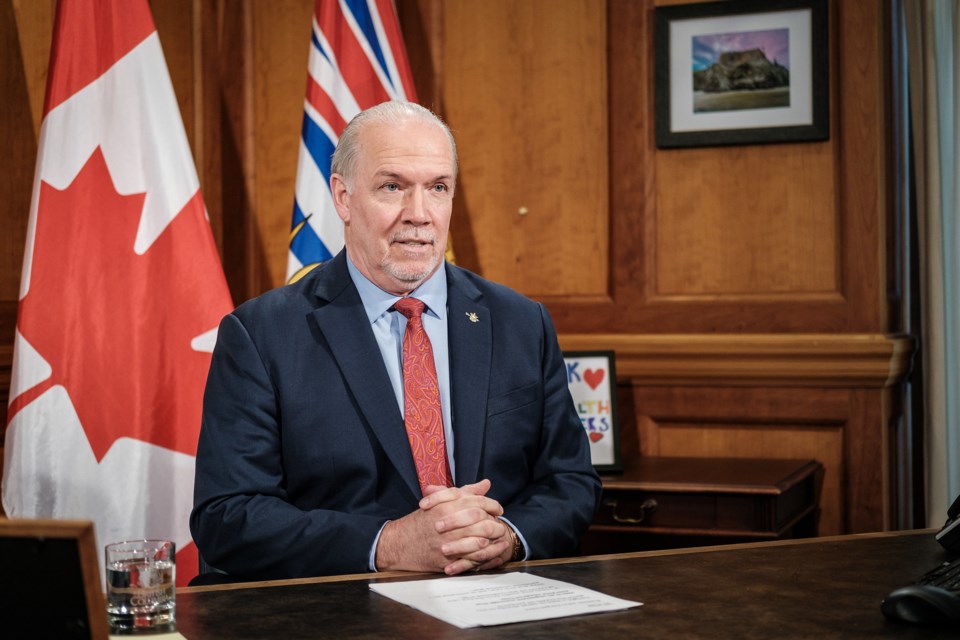Premier John Horgan is watching a growing display of civil disobedience play out in his own riding over his government’s old growth forest policies. But there’s little sign it actually concerns him.
More than 120 people have been arrested while protesting old growth logging by forestry company Teal-Jones in an area near Port Renfrew called Fairy Creek.
The RCMP have been active at the site for almost a week, arresting those who refuse to abide by a court injunction obtained by Teal-Jones.
The protest group is a mixture of hard-core environmentalists called the Rainforest Flying Squad, veteran activists like Tzeporah Berman, some local First Nations members (but not all; the community is split on the issue) and occasionally a visiting community group - like when 100 angry elderly hikers took it upon themselves to peacefully overwhelm an RCMP barrier by marching up the road and into the camp.
“Of course, the whole object here was to get the government to respond, to get Premier (John) Horgan to respond,” 82-year-old Saul Arbess told the Victoria News.
“We cannot understand why he hasn’t responded.”
Indeed, the larger environmental community appears surprised that the protests have failed to shake anything resembling concern out of the B.C. NDP government.
The B.C. Greens have repeatedly brought up the issue during question period at the legislature.
“The only thing that's missing — it's become clear over the past year — is the political will to do anything other than to continue to liquidate these forests,” Green MLA Adam Olsen said last Thursday in the house.
“My question is to the Minister of Forests. She has the information handed to her. She has the tools at her disposal to make the change. Will she live up to the premier's promise and immediately defer logging in these rare stands of old-growth forests?”
Forests Minister Katrine Conroy deflected the question as she’s done for several months now, saying the government is working on the problem.
“We all know that B.C.'s ancient forests are part of what makes this province such a great place to live,” she said.
“We are doing the work that needs to be done to protect them. We have started doing that work, protecting hundreds of thousands of hectares. We are continuing to do that work. We are doing the work, and we will continue to do that work.”
Olsen was clearly frustrated after weeks of getting the same brush-off, and began openly mocking the minister’s repeated use of the phrase “doing the work.”
“The answer is brutal, the inaction is brutal, and for the past three years, while we've asked questions about old-growth logging, our B.C. NDP colleagues have stared at the ground just wishing it would go away,” he shot back. “Well, we won't.”
It’s possible, though, that NDP MLAs aren’t staring at the ground out of shame, but rather, disinterest.
The NDP’s growing powerbase in Metro Vancouver cares little about forestry issues, and consequently neither do its urban MLAs.
Horgan didn’t need the support of the environmental groups protesting at Fairy Creek to win his majority government in October. In fact most of those groups allied with and endorsed the B.C. Greens. The premier owes them no favours. He’s unlikely to run for re-election, and even if he did, the protests in his riding wouldn’t make a dent in the commanding lead he’s enjoyed there for five elections.
In short: the environmentalists protesting old growth have little influence within B.C. NDP circles.
But the premier did spend his youth working in mills on Vancouver Island, and he clearly still identifies with the blue-collar forestry workers whose jobs depend on cutting down trees. It helps that thousands of them are represented by the United Steelworkers, the single largest donor to the B.C. NDP’s 2017 election campaign, before the party outlawed corporate and union donations.
All of which is important context when you consider the B.C. NDP’s foot-dragging on old growth.
The government did commission an expert report into the issue, which landed back on Horgan’s desk during the height of the COVID-19 pandemic last year and went untouched for many months.
The report recommends a radical shift in B.C.’s old growth forestry management, to emphasize ecological biodiversity over forestry. It calls for a halt to logging old growth forests in high-risk areas that should have kicked in in March.
Horgan promised during the election to enact all the recommendations in the report. But it’s clear watching his government since then it doesn’t intend to fully follow through on that promise, for fear of endangering forestry jobs in forest-dependent communities.
Instead, the province has tried half measures.
Conroy placed a temporary deferral on 353,000 hectares of “old growth” across the province, but environmentalists drilled down to determine much of that figure is misleading – the areas are sometimes double counted, already protected, not at risk of logging and in many cases not the kind of soaring large trees people would associated with old growth forests.
Horgan is reportedly planning to release a paper in June that will outline how he intends to balance protecting old growth while maintaining (or transitioning) forestry jobs.
It’s a tall task, and unlikely to make everyone happy.
The protests in the premier’s riding will likely continue, even if he’s not listening.
Rob Shaw has spent more than 13 years covering BC politics, now reporting for CHEK News and writing for The Orca. He is the co-author of the national best-selling book A Matter of Confidence, and a regular guest on CBC Radio.
SWIM ON:
- Rob Shaw last wrote the B.C. government may have lagged in releasing its restart plan compared to some other provinces like Saskatchewan, but it’s here now.
- The Pacheedaht First Nation’s official memo to the Capital Regional District was about as pointed as official memos get, noted Maclean Kay.
- Daniel Marshall recounted the tale of an early traveler - his dad - through these lands and the "graveyard of the Pacific."



